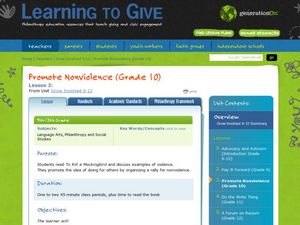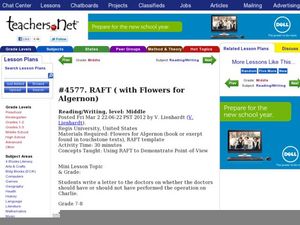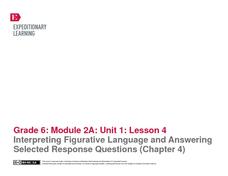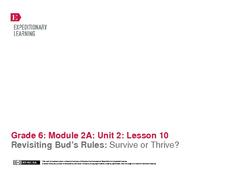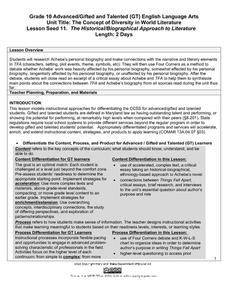Curated OER
Calorie Calculations through Beach Activities
Beach activity separates babes from blobs! Your class learns about calculating the number of calories used during physical activity. A worksheet is provided in which the activity of five different people at the beach is listed for...
Curated OER
Promote Nonviolence
Take a look at the topic of violence as seen in Harper Lee's To Kill a Mockingbird. Discuss together the values that Atticus holds and brainstorm ways to combat violence in a similar manner to what he portrays in the novel. Get your...
Curated OER
Flowers for Algernon: RAFT
Should Charlie undergo an operation to increase his intelligence? A mini-lesson for a unit on Daniel Keyes novel Flowers for Algernon uses a RAFT activity, which prompts students to write a letter to Charlie's doctors explaining why they...
Curated OER
Because of Winn-Dixie
Readers analyze an excerpt from Kate DiCamillo's novel Because of Winn-Dixie. They read silently, and then hear it read aloud. Definitions for underlined vocabulary words are in the margin, and other potentially difficult words...
Curated OER
'Me Fail English? That's Unpossible' : Studying Literature with "The Simpsons"
Does your class love The Simpsons? It might seem dated, but with reruns constantly popping up on television, this show still holds the attention of most of your learners. Play the opening sequence of an episode, and brainstorm any...
Curated OER
The Giver: Lesson 1
Do “memories need to be shared?" Are “memories…forever?" Would you give up memory to live in a perfect world? Introduce a unit centered on Lois Lowry’s utopian/dystopian novel The Giver with a series of activities that has groups...
Curated OER
Moby Dick Puppetry
Such an ambitious lesson! Third graders with special needs listen to an audio recording of the novel, Moby Dick. They stop often to discuss each of the main characters and analyze their actions in the story. They then make puppets of one...
EngageNY
Gathering Evidence and Drafting a Two-Voice Poem (Chapter 13: "Los Duraznos/Peaches")
Begin class with a short comprehension quiz and review and then move into a new genre: two-voice poems. The activity provides information about this type of poetry as well as a video example made by eighth graders that you can show your...
EngageNY
End-Of-Unit 2 Assessment: On-Demand Analytical Essay About How Esperanza Changes Over Time
Close the unit on Esperanza Rising with an in-class analytic essay on how Esperanza changes over the course of the novel. Writers can use any of their notes and work from the unit as well as their drafts of the first two paragraphs of...
Hawaiʻi State Department of Education
Illustrating Text
Ideas like this are highly effective for helping build better reading comprehension. The class listens to an excerpt from a grade-appropriate text, and they discuss what clues or words helped them visualize the scene. They then read a...
Virginia Department of Education
Developing an Essay: Word Choice
Grading essays after reading a novel written by a lyrical master (think Nabokov, Morrison, Chabon) is a deflating experience. Why can’t your student’s display the same skill in diction as your favorite writers? Because you did not use...
All for KIDZ
Building Relationships: The Orphan of Ellis Island
Family and friendship are two very important themes of the historical fiction novel The Orphan of Ellis Island by Elvira Woodruff. From video clips and writing prompts to reader's theater and family interviews, this resource...
Scholastic
Frindle Lesson Plan
"Who says a pen has to be called a pen? Why not call it a frindle?" Inspired by this quote from the award-winning novel written by Andrew Celements, this lesson plan allows children to invent their own...
Center for the Advancement of Ethics and Character
Charlotte's Web: A Story About Friendship
Strengthen the bonds of friendship within your class with a reading of E.B. White's award-winning novel, Charlotte's Web. Focusing on the unique characters in the story and the relationships they develop, young readers draw...
EngageNY
Interpreting Figurative Language and Answering Selected Response Questions (Chapter 4)
To prepare for an assessment of how well individuals are progressing with their ability to identify and analyze figurative language and its effect on tone and meaning, pairs work through Chapter Four of Christopher Paul Curtis'...
Avi Writer
The Cross of Lead, At the Edge of the World, and The End of Time
A fan of Ari's Crispin trilogy? Here is a packet that contains study guides for all three Crispin novels: The Cross of Lead, At the Edge of the World, and The End of Time.
Illustrative Mathematics
Running Around a Track I
The accuracy required by the design and measurement of an Olympic running track will surprise track stars and couch potatoes alike. Given a short introduction, the class then scaffolds into a detailed analysis of the exact nature of the...
Illustrative Mathematics
Regular Tessellations of the Plane
Bringing together the young artists and the young organizers in your class, this lesson takes that popular topic of tessellations and gives it algebraic roots. After covering a few basic properties and definitions, learners attack the...
Scholastic
Reading Symbols
Philip Pullman's The Golden Compass serves as the anchor text for a lesson on symbolism. Readers use the provided worksheets to examine the symbols in the novel as well as in the world around them.
Maryland Department of Education
The Concept of Identity Lesson 8: Propaganda in Visual Media
Visual and print propaganda are featured in a lesson that asks readers of A Separate Peace to examine the techniques used in propaganda from World War I, World War II, presidential elections, and in the novel.
EngageNY
Qualities of a Strong Literary Argument Essay
One activity, two essays, and one central theme: qualities of an argument essay. Here, scholars first describe the qualities of an argument essay regarding Bud's rules to live by from the novel Bud, Not Buddy by Christopher Paul Curtis....
EngageNY
Revisiting Bud’s Rules: Survive or Thrive?
Bud followed a series of rules from Bud, Not Buddy by Christopher Paul Curtis. The question is, how did he use those rules to thrive or survive? After a grand discussion, class members explore the novel to locate and cite textual...
EngageNY
Grade 10 ELA Module 1: Unit 3, Lesson 10
Parental relationships have a huge impact on our personalities, for better or for worse. Read about Mike's relationship with his father in H.G. Bissinger's Friday Night Lights and how it informed the novel's central idea.
Maryland Department of Education
The Concept of Diversity in World Literature Lesson 11: The Historical/Biographical Approach to Literature
How affected is Thinks Fall Apart by Chinua Achebe's personal biography? Using a four corners strategy, and evidence from their readings, class members debate the degree of biographical influence in Achebe's novel.



